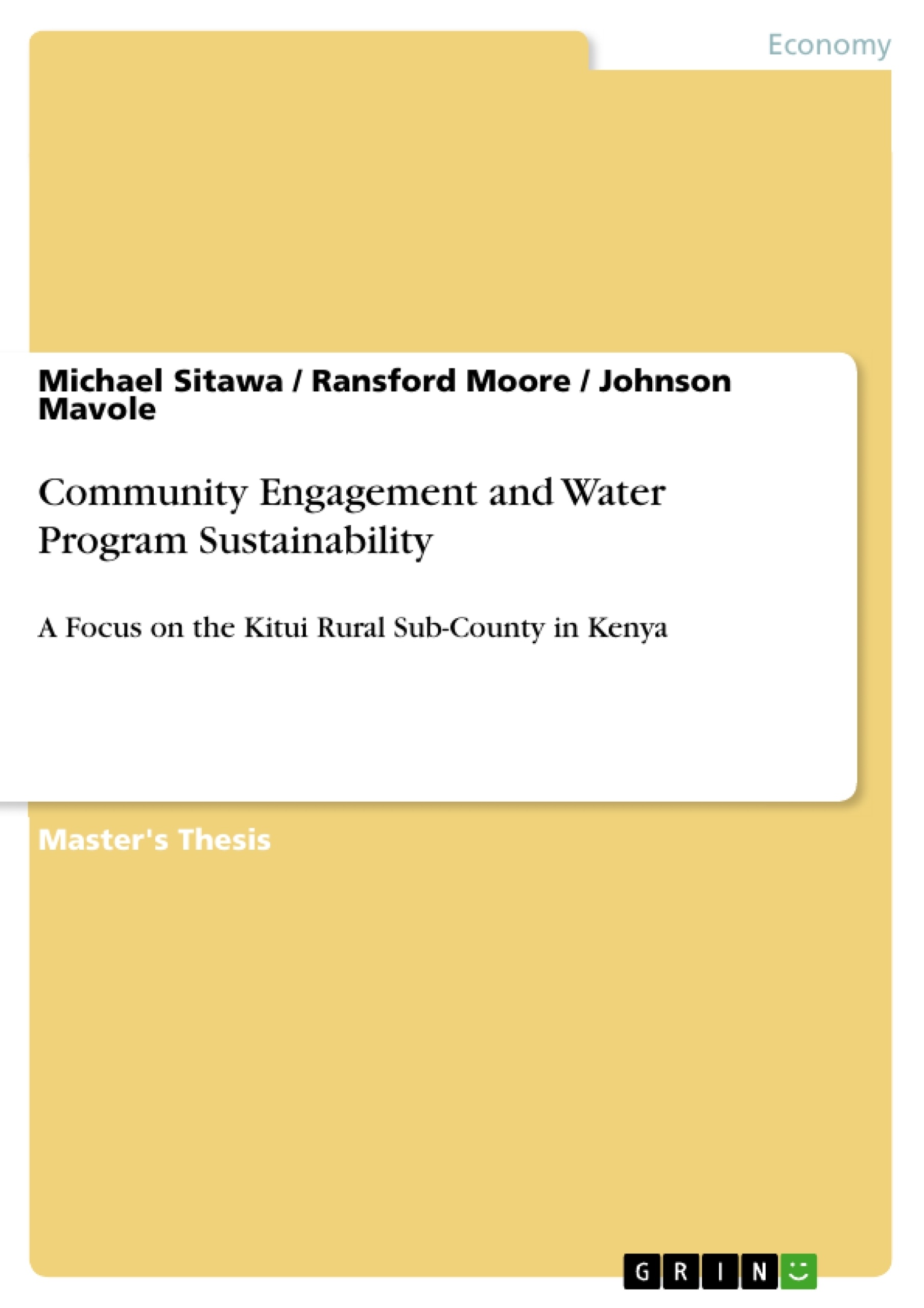The study serves to bring out a number of important issues under the discourse of community engagement. First, this study is key to informing policy debates on matters or issues of sustainability linkages, and it contributes as well to the present literature on the discourse around community engagement and program sustainability in Kenya. Secondly, of keen interest to the study is that it also seeks to explore and shed light on a myriad of areas that development actors on the continent could seize in a bid to improve the social-economic conditions of under-served and disadvantaged communities. This is in line with international obligations on effective community engagement for program sustainability.
Community engagement plays a vital role in ensuring sustainability of outcome and has become a buzz terminology in the global sustainability discourse. When communities are effectively engaged on a particular initiative, the outcome leads to mutual benefits and durability. With the growing interest in engagement strategies for sustainable outcomes the researcher focuses his attention on community engagement in relation to water program sustainability.
The study adopts a mixed research approach and collects data from participants through random sampling method using questionnaires administered by the help of enumerators and in-depth interview with key informants.
Inhaltsverzeichnis (Table of Contents)
- ABSTRACT
- ABBREVIATIONS AND ACRONYMS
- CHAPTER ONE
- INTRODUCTION
- 1.1 Study Background
- 1.2 Statement of the Problem
- 1.3 Research Objectives
- 1.4 Research Questions
- 1.5 Assumptions of the Study
- 1.6 Justification of the Study
- 1.7 Significance of the Study
- 1.8 Scope and Delimitation of the Study
- 1.9 Limitations of the Study
- 1.10 Conceptual framework
- 1.11Operational Definition of Terms
- CHAPTER TWO
- LITERATURE REVIEW
- Introduction
- 2.1 Critical Review of Relevant Theories
- 2.1.1 Empowerment Theory
- 2.1.2 Sustainability Theory
- 2.2 Review of Empirical Studies
- 2.2.1 Communication on Program Sustainability
- 2.2.2 Role of Community on Water Program Sustainability
- 2.2.3 Role of Program Implementers on Program Sustainability
- 2.2.4 Role of Infrastructure on Program Sustainability
- 2.3 Chapter Summary
- CHAPTER THREE
- RESEARCH DESIGN AND METHODOLOGY
- Introduction
- 3.1 Research Design
- 3.2 Site description, Study population and Target population
- 3.3 Sampling and Sampling Techniques
- 3.4 Methods and Instrument of Data Collection
- 3.5 Reliability and Validity
- 3.6 Data Analysis Procedures
- 3.7 Ethical Consideration of the Study
- CHAPTER FOUR
- DATA PRESENTATION AND INTERPRETATION OF FINDINGS
- Introduction
- 4.1 Response Rate
- 4.2 Presentation of Findings
- 4.3 Demographic Details of Participants
- 4.3.1 Gender Distribution
- 4.3.2 Age Distribution of Respondents
- 4.3.3 Categorization of Respondents
- 4.4 The Influence of Communication on Water Program Sustainability
- 4.5 The Role of Community on Water Program Sustainability
- 4.7 The role of Infrastructure on Water Program Sustainability
- 4.8 Chapter Summary
- CHAPTER FIVE
- SUMMARY, CONCLUSIONS AND RECOMMENDATIONS
- Introduction
- 5.1 Summary of the findings
- 5.2 Recommendations
- REFERENCES
Zielsetzung und Themenschwerpunkte (Objectives and Key Themes)
The primary objective of this study is to examine the connection between community engagement and the sustainability of water programs in Kitui Rural Sub-County, Kenya. The research utilizes a mixed research approach to explore how communication, community participation, program implementers, and infrastructure influence the long-term success of water projects.
- The role of community engagement in water program sustainability.
- The influence of communication strategies on program success.
- The impact of various leadership styles and roles in program implementation.
- The relationship between infrastructure and water program sustainability.
- The effectiveness of empowerment theory and sustainability theory in understanding water program outcomes.
Zusammenfassung der Kapitel (Chapter Summaries)
Chapter One introduces the study, outlining its background, problem statement, research objectives, and questions. It establishes the study's justification, significance, scope, limitations, and conceptual framework, laying the groundwork for the subsequent analysis. Chapter Two delves into the literature review, exploring relevant theories, such as empowerment theory and sustainability theory, and examining empirical studies on community engagement, communication, leadership, and infrastructure in relation to water program sustainability. Chapter Three outlines the research design and methodology, detailing the study area, population, sampling techniques, data collection methods, and data analysis procedures. Chapter Four presents the data analysis, focusing on the relationship between communication, community participation, program implementers, and infrastructure on water program sustainability.
Schlüsselwörter (Keywords)
The key terms and focus topics explored in this research include community engagement, water program sustainability, communication strategies, leadership roles, infrastructure, empowerment theory, and sustainability theory. The study investigates the connection between these factors in the context of Kitui Rural Sub-County, Kenya, offering insights into the critical elements for successful and long-lasting water projects.
Frequently Asked Questions
What is the main objective of the Kitui Rural Sub-County study?
The study aims to examine the connection between community engagement and the long-term sustainability of water programs in Kenya.
Which theories are used to understand water program sustainability?
The research primarily utilizes Empowerment Theory and Sustainability Theory to analyze project outcomes.
How does communication influence water projects?
Effective communication between implementers and the community is vital for transparency, mutual benefit, and the durability of the water infrastructure.
What research methodology was adopted for this study?
The researcher used a mixed research approach, combining random sampling questionnaires with in-depth interviews of key informants.
What role does infrastructure play in sustainability?
The study investigates how the quality and management of physical infrastructure directly impact the continued availability of water services for underserved communities.
- Quote paper
- Michael Sitawa (Author), Ransford Moore (Author), Dr Johnson Mavole (Author), 2018, Community Engagement and Water Program Sustainability, Munich, GRIN Verlag, https://www.grin.com/document/445368



